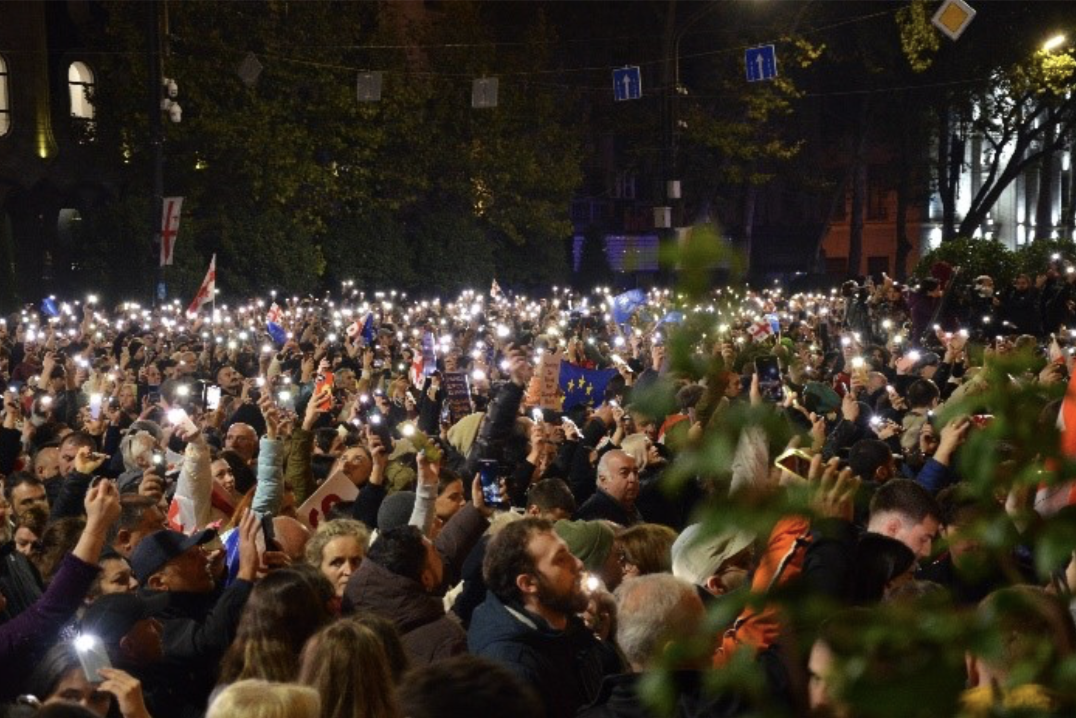
Developments in the South Caucasus have been interpreted by a new hybrid aggression strategy from Russia. Whilst this strategy differs from the conventional battlefields we see in Ukraine; it begs the question of whether Europe will open its eyes to this new reality of cyber warfare.
So what happened in Georgia?
On the 26th of October 2024, the incumbent party, Georgian Dream Party (GDP), were re-elected with a supposed 54% vote share out of the 99% precincts counted. This has allowed them to continue occupying the power which they have held since 2012, and the opportunity to declare the freezing of EU integration.
The result has been met with widespread criticism, both domestically and internationally. With Georgia now experiencing a month of protests from dissatisfied citizens, with the opposition leader, Nika Gvaramia, condemning the results as a “constitutional coup”. International players, such as the US and EU, are calling foul play by the GDP and Russia, and demanding a fair re-election monitored by an independent body.
What is the evidence of foul play?
The election results contrasted starkly with numerous developments in Georgia.
Firstly, it seems to oppose the growing public sentiment, with 80% of the Georgian population having declared their support for Georgia’s integration in the EU.
Secondly, the European Parliament News reported that there had been numerous documented “cases of intimidation of voters, vote manipulation, interference with election observers, and media manipulation involving electronic voting machines”.
Thirdly, is the new system of proportional representation that has been implemented. This new system suggested that it was likely for a coalitional government to rule. Instead, the GDP managed, or “manufactured” a significant majority.
Fourth is the GDP’s billionaire founder, Bidzina Ivanishvili. An oligarch who made his wealth in metals and banking in Russia during the collapse of the Soviet Union. Whilst Ivanishvili has stepped down as the leader of GDP, it is widely recognised that he leads the party from behind the scenes.
What else has happened?
Unfortunately, Georgia’s contested elections are not the first or last incident of potential Russian interference. In early October, Moldova’s top officials reported to Politico that Moscow had built a “mafia-style” network to rig an upcoming referendum. This was done through a distribution of cash to voters to influence their decisions, $15 million was found in more than 130,000 Moldovan citizens bank accounts.
A month after the Georgian elections, on the 24th of November, Romania had its first round of elections and saw the victory of pro-Russia candidate Georgescu. His rise shocked the domestic and international scene, as he seemed to appear from nowhere after a successful TikTok campaign. De-classified intelligence documents allege that influencers and individuals tied with organised crime were paid to promote his candidacy. This has all led to the postponement of the election until May 24th 2025, in hopes to combat Russia’s aggressive hybrid warfare.
What should Europe do?
Incidents in Georgia, Moldova, and Romania, are all examples of Russia’s attack of the rule-based order that has promoted democracy and reigned supreme over our geopolitical environment until present. Russia’s novel approach demands European powers to address their counterstrategies to protect democracy.
The EU and US have both called for new elections to be held, however with a new US administration adopting isolationist policies, the risk and responsibility falls into Europe’s hands. This election win is undoubtedly a victory for Russia as it has increased its influence and ties in the Caucasus, which had taken a hit since the invasion of Ukraine in 2022. However, for the West it signifies the loss of a key ally in a strategically important region.
Considering, the Ukrainian War appears increasingly likely to end favourably for Vladimir Putin, due to Donald Trump’s determination to end the conflict sooner rather than later, questions arise for the future of European security. If Europe’s inaction on the Georgian election is interpreted by Russia as a green-light, the future of Western democratic elections could be put at great risk.
As put by a report from The Tony Blair Institute, this event of “hybrid interference is a symptom of a growing geopolitical confrontation with Russia, not the cause”.



Average Rating